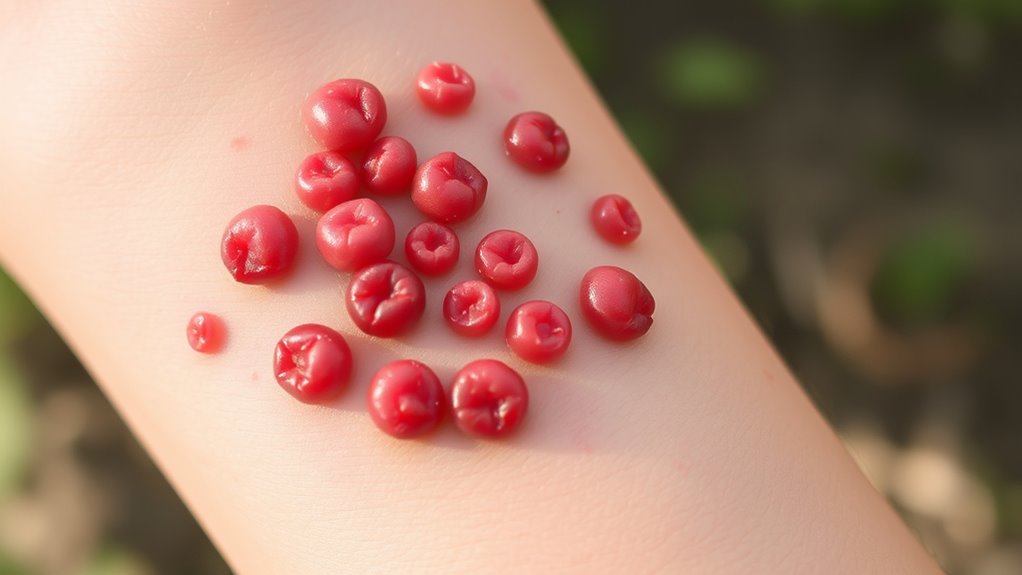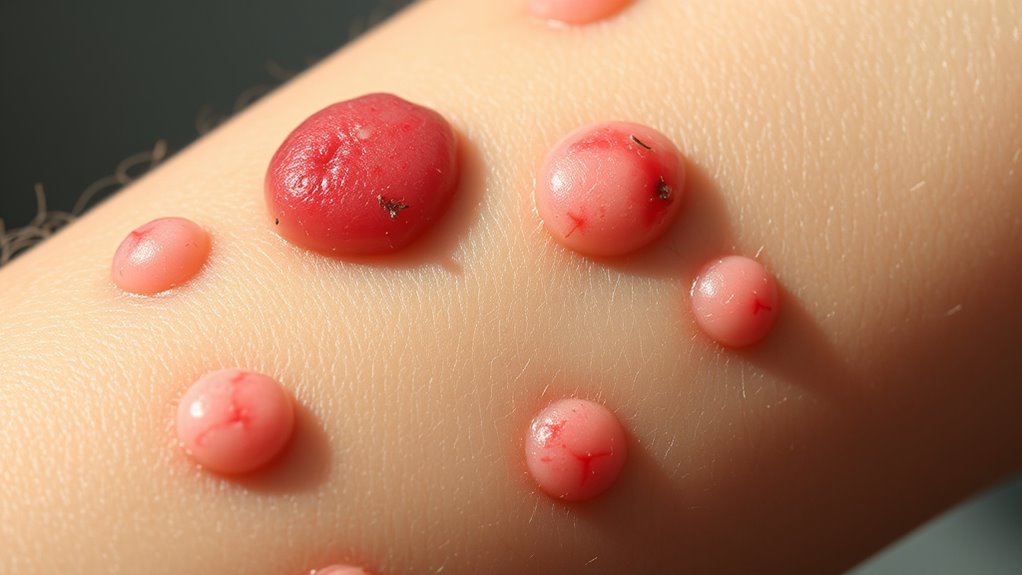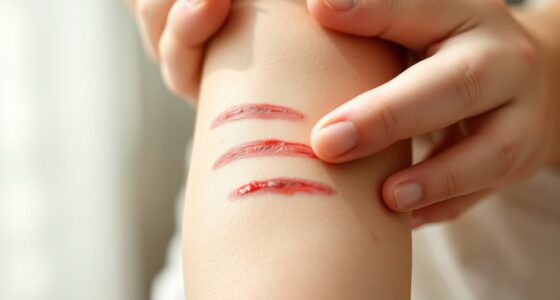If you’re bitten or stung, first remove the stinger if it’s still in your skin using tweezers or your fingernail. Clean the area with soap and water, then apply a cold compress to reduce swelling and pain. Use antihistamines or hydrocortisone creams for itching, and watch for signs of allergic reactions like difficulty breathing or dizziness. Staying prepared and knowing where to act can protect you — keep going to learn more about effective first aid steps.
Key Takeaways
- Carefully remove stingers and clean the area to prevent infection.
- Apply cold compress and OTC antihistamines or hydrocortisone for swelling and itching.
- Monitor for allergic reactions such as difficulty breathing or swelling beyond the bite site.
- Use protective clothing and insect repellent to prevent bites and stings.
- Seek emergency medical help immediately if severe allergic symptoms or difficulty breathing occur.

During warm months, bug bites and stings are common nuisances that can cause discomfort and health concerns. When these happen, it’s important to understand how to respond quickly and effectively. A key step is proper insect identification. Recognizing which bug caused the bite or sting helps determine the severity and guides your next actions. For example, a mosquito bite typically appears as a small, itchy bump, while a bee sting often leaves a stinger behind and causes localized swelling. Knowing these differences allows you to apply the right treatment and decide if medical attention is necessary. It also helps you take steps to prevent future bites by avoiding known insect habitats or using protective clothing.
Prevention is your best defense, especially if you’re prone to allergic reactions. Allergy prevention involves understanding your risk factors. If you’ve had severe reactions before, it’s vital to carry an epinephrine auto-injector and inform those around you about your allergy. Wearing long sleeves, pants, and insect repellent can considerably reduce the chances of getting stung or bitten. Avoiding sweet scents that attract insects and staying away from standing water where many bugs breed also help. Educating yourself about local insects and their behaviors allows you to be more cautious when spending time outdoors. For instance, knowing that wasps tend to be more aggressive in late summer can help you stay alert and avoid provoking them. Additionally, staying aware of natural deterrents can further reduce your risk of bites.
If you do get stung or bitten, your immediate response should focus on minimizing discomfort and preventing complications. Remove the stinger carefully if it’s still lodged in your skin, using a pair of tweezers or your fingernails. Clean the area with soap and water to prevent infection. Applying a cold compress or ice pack reduces swelling and eases pain. Over-the-counter remedies like antihistamines or hydrocortisone creams can help alleviate itching and inflammation. Keep an eye out for signs of an allergic reaction, such as difficulty breathing, dizziness, or swelling beyond the bite area. If any of these symptoms occur, seek emergency medical help immediately.
Taking these steps not only manages the immediate effects of bug bites and stings but also contributes to allergy prevention. By understanding insect identification and knowing how to respond, you protect yourself and your loved ones from potential health risks. Staying vigilant and prepared ensures that your outdoor activities remain enjoyable and safe, even during bug-prone months. Remember, quick, informed actions are your best defense against the discomfort and dangers associated with bug bites and stings.
Frequently Asked Questions
How Can I Tell if a Bug Bite Is a Serious Allergic Reaction?
If you notice allergic symptoms like swelling, hives, difficulty breathing, or dizziness after a bug bite, it’s a sign of a serious allergic reaction. Emergency signs include throat tightness, chest pain, or loss of consciousness. Act quickly by calling emergency services and using an epinephrine auto-injector if available. Don’t wait—prompt treatment can be life-saving. Seek medical help immediately if you experience any of these symptoms.
Are There Natural Remedies to Relieve Bug Bite Itching?
Did you know that herbal remedies have been used for centuries to soothe skin? To relieve bug bite itching naturally, try applying essential oils like tea tree or lavender, which have anti-inflammatory properties. You can also use aloe vera or a paste of baking soda and water. These remedies help reduce itching and inflammation, providing relief without harsh chemicals. Just remember to dilute essential oils properly before applying to your skin.
When Should I See a Doctor for a Bug Sting?
You should see a doctor immediately if you experience severe allergy symptoms like difficulty breathing, swelling beyond the sting area, or dizziness. Seek emergency treatment if you notice signs of anaphylaxis, such as chest tightness or a rapid pulse. Also, visit a healthcare professional if the sting causes intense pain, spreading redness, or signs of infection. Prompt medical care can prevent serious complications and guarantee proper treatment.
Can Bug Bites Transmit Diseases?
Imagine a tiny spy sneaking into your home—bug bites can transmit diseases like mosquito-borne illnesses and ticks transmitting diseases. Yes, bug bites can indeed transmit diseases, especially from mosquitoes and ticks. Mosquitoes can carry illnesses like West Nile Virus, while ticks are known to transmit Lyme disease. To protect yourself, avoid bug-heavy areas and check for ticks after outdoor activities. Stay vigilant to prevent these hidden threats.
How Can I Prevent Bug Bites During Outdoor Activities?
To prevent bug bites during outdoor activities, wear protective clothing like long sleeves and pants to minimize exposed skin. Apply insect repellents containing DEET or picaridin to deter insects effectively. Stay on designated paths and avoid tall grasses or standing water where bugs thrive. These preventive measures help reduce your risk of bites, keeping you comfortable and safe during outdoor adventures.
Conclusion
So, next time you’re annoyed by a bug bite or sting, remember it’s a small reminder that nature’s little surprises can turn your day upside down. While first aid helps, it’s ironic how something so tiny can cause such discomfort, forcing you to pause and deal with it. Sometimes, a simple sting teaches us to appreciate the calm before the next unexpected encounter. After all, life’s little bites keep us on our toes, don’t they?









